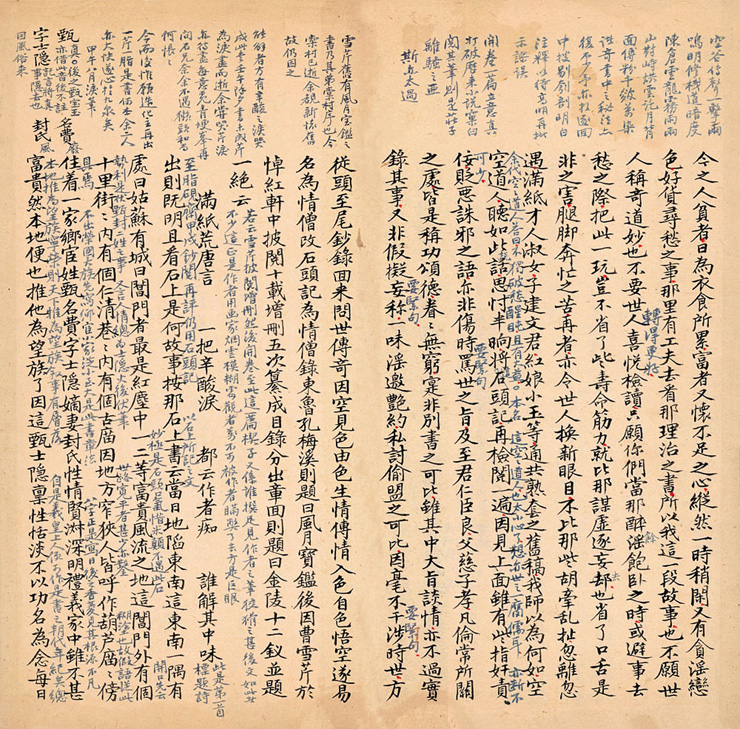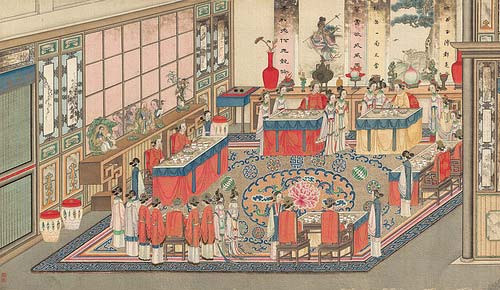|
Grandmother Jia
Grandmother Jia ( zh, t=賈母, p=Jiǎ Mǔ), née Shi, so often also called Dowager Shi ( zh, s=史太君, p=Shǐ Tàijūn) or simply the Dowager, is a major character in the 18th century Chinese novel ''Dream of the Red Chamber''. She is the daughter of Marquis Shi of Jinling. She is also Baoyu and Daiyu's grandmother and the oldest and most respected authority of the Jia Clan. A doting figure, it was she who arranged for Daiyu, her only "outside" (i.e., maternal) grandchild, to come to the Rongguo Mansion. It was with her help that Baoyu and Daiyu became extremely close as childhood playmates, and eventually, kindred spirits and lovers. Grandmother Jia is at heart a fun-loving elder who greatly enjoys conversation and the company of her many grandchildren. A Chinese opera fan, despite her great wealth and prestige she is mindful of the rustic poor like Granny Liu, and is pious and generous in almsgiving. The Dowager's descendants and close relatives include: *two sons, Jia She ... [...More Info...] [...Related Items...] OR: [Wikipedia] [Google] [Baidu] |
Chinese Language
Chinese (, especially when referring to written Chinese) is a group of languages spoken natively by the ethnic Han Chinese majority and many minority ethnic groups in Greater China. About 1.3 billion people (or approximately 16% of the world's population) speak a variety of Chinese as their first language. Chinese languages form the Sinitic branch of the Sino-Tibetan languages family. The spoken varieties of Chinese are usually considered by native speakers to be variants of a single language. However, their lack of mutual intelligibility means they are sometimes considered separate languages in a family. Investigation of the historical relationships among the varieties of Chinese is ongoing. Currently, most classifications posit 7 to 13 main regional groups based on phonetic developments from Middle Chinese, of which the most spoken by far is Mandarin (with about 800 million speakers, or 66%), followed by Min (75 million, e.g. Southern Min), Wu (74 million, e.g. Shangh ... [...More Info...] [...Related Items...] OR: [Wikipedia] [Google] [Baidu] |
Lady Wang
Lady Wang (王夫人) is a character in the classic Chinese 18th century novel ''Dream of the Red Chamber''. She is the wife of Jia Zheng, and mother of Jia Zhu (dead at the start of the novel), Jia Yuanchun and Jia Baoyu. She is the elder sister of Aunt Xue and hence the maternal aunt to Xue Baochai and Xue Pan. She is on the surface a kind lady and a devout Buddhist, who delegates authority to her niece Wang Xifeng in the everyday running of the Rongguo household. However, she is prone to malicious rumors, and can act with cruelty towards maids she thinks are seducing her son. Lady Wang is one of the culprits resulting in the death of Baoyu's maid Qingwen Manchu (Manchu:, ) is a critically endangered East Asian Tungusic language native to the historical region of Manchuria in Northeast China. As the traditional native language of the Manchus, it was one of the official languages of the Qing dy .... Wang, Lady Wang, Lady {{novel-char-stub ... [...More Info...] [...Related Items...] OR: [Wikipedia] [Google] [Baidu] |
Shi Xiangyun
Shi Xiangyun () is a major fictional character in the classic 18th century Chinese novel ''Dream of the Red Chamber'', one of the characters known as the Twelve Beauties. She is Jia Baoyu's younger second cousin by the Dowager, Grandmother Jia. Xiangyun is the favorite grandniece of the Dowager, Baoyu's grandmother. Orphaned since infancy, she grew up under the watchful eyes of her wealthy maternal aunt and uncle who lives in Jinling. They use her unkindly to do embroidery and needlework for the family late into the night. Despite her misfortune, she is always cheerful and ready to play a small joke. Her cheer and open-heartedness make her pranks forgiven by most. She is also excellent in embroidery and is forthright without tact. She wears a golden qilin by her neck. Xiangyun is portrayed as a tomboy-ish girl who does not cultivate the over-refined nature of most feudal ladies. She looks fine in men's clothes and loves to drink and eat meat. Apparently an androgynous beauty, h ... [...More Info...] [...Related Items...] OR: [Wikipedia] [Google] [Baidu] |
Lin Ruhai
Lin or LIN may refer to: People *Lin (surname) (normally ), a Chinese surname *Lin (surname) (normally 蔺), a Chinese surname * Lin (''The King of Fighters''), Chinese assassin character *Lin Chow Bang, character in Fat Pizza Places *Lin, Iran, a village in Mazandaran Province *Lin, Korçë, village in Pogradec municipality, Albania *Lin County, Henan, now Linzhou, China *Lin County, Shanxi, in China *Lincolnshire, Chapman code LIN Transport * Linate Airport, Milan, Italy * Linlithgow railway station, West Lothian, Scotland Other uses * LIN Media, a US TV broadcaster * Lingala language, a Bantu language of central Africa * Local Interconnect Network, for vehicle computers * ''lin.'', an abbreviation for linear See also * Linn (other) * Lyn (other) * Lynn (given name) Lynn or Lynne is a predominantly feminine given name in English-speaking countries. It is now more popular as a middle name than as a first name. It comes from Welsh, meaning "lake". It is also ... [...More Info...] [...Related Items...] OR: [Wikipedia] [Google] [Baidu] |
Wang Xifeng
Wang Xifeng (, rendered Phoenix in Chi-chen Wang's translation) is one of the principal characters in the classic 18th century Chinese novel ''Dream of the Red Chamber''. She came from one of the Four Great Families, the Wang (the other three are Jia, Shi, and Xue), and is known for her wit and intelligence, her vivacious manner, her great beauty, her multiple-faced personality and her fierce sense of fidelity. Her family had great faith in her and brought her up as a boy; in fact, the name “Xifeng” is considered masculine in her era. This accounts for her self-assuredness and straightforward ways, characteristics that do not quite fit with the traditional female role at the time. Relations Xifeng is a niece of Lady Wang and is married to Jia Lian, the eldest grandchild of Grandmother Jia (hence, she is related to Baoyu by blood and by marriage). As such she plays a significant role in the day-to-day running of the Rongguo household; in fact, she is the ''de facto'' holder of ... [...More Info...] [...Related Items...] OR: [Wikipedia] [Google] [Baidu] |
Jia Tanchun
Jia Tanchun ( Chinese: 賈探春; Pinyin: Jiǎ Tànchūn, rendered Quest Spring in Chi-chen Wang's translation) is the younger half-sister of Jia Baoyu and a major character in the 18th century Chinese novel ''Dream of the Red Chamber''. She is the daughter of Jia Zheng and his concubine, Concubine Zhao. Tanchun is a very clever and capable person, once temporarily managing all household and economical affairs of the Rongguo Mansion when Wang Xifeng had a miscarriage. Despite this achievement, however, the fact she is the daughter of a concubine is still such a burden that she often claims Lady Wang Lady Wang (王夫人) is a character in the classic Chinese 18th century novel ''Dream of the Red Chamber''. She is the wife of Jia Zheng, and mother of Jia Zhu (dead at the start of the novel), Jia Yuanchun and Jia Baoyu. She is the elder sis ..., Baoyu's mother, as her own. Tanchun is also the "founder" of the White Crabapple Poetry Club, a private poetry club for the resi ... [...More Info...] [...Related Items...] OR: [Wikipedia] [Google] [Baidu] |
Jia Lian
''Dream of the Red Chamber'' (''Honglou Meng'') or ''The Story of the Stone'' (''Shitou Ji'') is a novel composed by Cao Xueqin in the middle of the 18th century. One of the Four Great Classical Novels of Chinese literature, it is known for its psychological scope, and its observation of the worldview, aesthetics, life-styles, and social relations of 18th-century China. The intricate strands of its plot depict the rise and decline of a family much like Cao’s own and, by extension, of the dynasty itself. Cao depicts the power of the father over the family, but the novel is intended to be a memorial to the women he knew in his youth: friends, relatives and servants. At a more profound level, the author explores religious and philosophical questions, and the writing style includes echoes of the plays and novels of the late Ming, as well as poetry from earlier periods. Cao apparently began composing it in the 1740s and worked on it until his death in 1763 or 1764. Copies of h ... [...More Info...] [...Related Items...] OR: [Wikipedia] [Google] [Baidu] |
Lady Xing
The word ''lady'' is a term for a girl or woman, with various connotations. Once used to describe only women of a high social class or status, the equivalent of lord, now it may refer to any adult woman, as gentleman can be used for men. Informal use is sometimes euphemistic ("lady of the night" for prostitute) or, in American slang, condescending in direct address (equivalent to "mister" or "man"). "Lady" is also a formal title in the United Kingdom. "Lady" is used before the family name of a woman with a title of nobility or honorary title ''suo jure'' (in her own right), or the wife of a lord, a baronet, Scottish feudal baron, laird, or a knight, and also before the first name of the daughter of a duke, marquess, or earl. Etymology The word comes from Old English '; the first part of the word is a mutated form of ', "loaf, bread", also seen in the corresponding ', "lord". The second part is usually taken to be from the root ''dig-'', "to knead", seen also in dough; the s ... [...More Info...] [...Related Items...] OR: [Wikipedia] [Google] [Baidu] |
Dream Of The Red Chamber
''Dream of the Red Chamber'' (''Honglou Meng'') or ''The Story of the Stone'' (''Shitou Ji'') is a novel composed by Cao Xueqin in the middle of the 18th century. One of the Four Great Classical Novels of Chinese literature, it is known for its psychological scope, and its observation of the worldview, aesthetics, life-styles, and social relations of 18th-century China. The intricate strands of its plot depict the rise and decline of a family much like Cao’s own and, by extension, of the dynasty itself. Cao depicts the power of the father over the family, but the novel is intended to be a memorial to the women he knew in his youth: friends, relatives and servants. At a more profound level, the author explores religious and philosophical questions, and the writing style includes echoes of the plays and novels of the late Ming, as well as poetry from earlier periods. Cao apparently began composing it in the 1740s and worked on it until his death in 1763 or 1764. Copies of hi ... [...More Info...] [...Related Items...] OR: [Wikipedia] [Google] [Baidu] |
Jia Zheng
''Dream of the Red Chamber'' (''Honglou Meng'') or ''The Story of the Stone'' (''Shitou Ji'') is a novel composed by Cao Xueqin in the middle of the 18th century. One of the Four Great Classical Novels of Chinese literature, it is known for its psychological scope, and its observation of the worldview, aesthetics, life-styles, and social relations of 18th-century China. The intricate strands of its plot depict the rise and decline of a family much like Cao’s own and, by extension, of the dynasty itself. Cao depicts the power of the father over the family, but the novel is intended to be a memorial to the women he knew in his youth: friends, relatives and servants. At a more profound level, the author explores religious and philosophical questions, and the writing style includes echoes of the plays and novels of the late Ming, as well as poetry from earlier periods. Cao apparently began composing it in the 1740s and worked on it until his death in 1763 or 1764. Copies of h ... [...More Info...] [...Related Items...] OR: [Wikipedia] [Google] [Baidu] |






